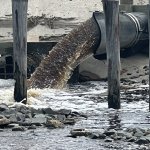LOWER TOWNSHIP – The Sunset Beach Sportsman’s Club was born in the shadow of a hot, smoking magnesite plant on Sunset Boulevard, Cape May Point. Workers from the now-defunct plant called the club ‘home’ for decades, and today, the club is an active participant in community fundraisers and is a haven for county veterans.
The club was served a 90-day eviction notice Feb. 1, 2022, by the state Department of Environmental Protection (DEP), and the club’s future is currently unclear.
Ed Clavan, current president of the club, says that state agencies, including the DEP’s Division of Fish and Wildlife, are using bullish tactics to force them out of the building they have called home for decades.
The club lived through the entire lifetime of the plant.The previous owners of the club had an agreement with the magnesite plant’s owners, and when the land (now part of Higbee Beach Wildlife Management Area) was returned to the state, there was initial unease about the club’s future, but in the nearly 40 years since, the state was silent.
Emaleigh Kaithern, membership committee chairperson for the club, said that the club and its members want nothing more than to preserve the long-standing status quo, and hopes to remain in the building that the club built and pays taxes on.
“We operated on the goodwill assumption year after year that the state won’t kick us out. It’s 2022 now, and we’re still here decades later, but it has always been a ghost in the closet,” she said.
That goodwill seems to have evaporated despite little change on the club’s part. In June 2021, the New Jersey Division of Fish and Wildlife asked Lower Township to revoke the club’s liquor license despite the club’s spotless record. When the challenge was heard at a public meeting, nobody from the state appeared to make a case, and the license was retained, with support from the municipality.
The letter from the DEP, served Feb. 1, 2022, is titled a “Notice to Quit and Demand for Delivery of Possession of Premises.” The letter cites three reasons for the termination of the club’s use of the land.
The first is because of the “sale, service, and use of alcohol on a Wildlife Management Area without the prior written permission or other authorization from the Department.”
The second claim is that the “club’s mission and activities are an ‘interference’ with the National Coastal Wetlands Conservation Grant…”
The final reason cited in the letter is that the “club’s use of the premises is inconsistent with the Division of Fish and Wildlife’s mission to preserve, conserve, and protect the land as a habitat for game, nongame, and threatened and endangered species of wildlife…”
The club maintains that it has not interfered with local wildlife, and club members say they have worked for decades to keep the small lot in pristine condition.
Ken Laricks, president of the club from 2015 to 2020, stressed that the club has done its very best to maintain a strong community image and that the challenges to the liquor license were not logical. The club’s members fight against the notion that the club is a ‘good ol’ boys’ hangout or a spot for drunks.
“We aren’t just some guys sitting around drinking beer and playing pool. We’re really active in the community. We love this place, these towns,” Laricks said.
Administrators and members of the club are not sure why the state is just now acting on a lease that expired nearly four decades ago. Christopher Gillin-Schwartz, the lawyer representing the club, said that the state’s motives are unclear given the building’s proximity to other developments that the state is not acting on.
“The club is right behind a gift shop and a mini-golf course,” he said. “If you didn’t know any better, you’d think the clubhouse is an attachment to what is there already. They aren’t getting in anybody’s way.”
Pam Kaithern, former mayor of West Cape May, pointed towards 2014 state plans to expand protected Higbee land into a state park as a point of concern, but even still, the club’s building is less than 3,000 square feet out of a protected area that is hundreds of acres.
The building sits next to a paved road and parking lot and does not appear to overlap with the proposed development. Pam Kaithern said that the tourism brought by a public state park would have a greater impact on local ecology than the club ever has.
“When you start adding that many people to the mix, you start seeing a lot of traffic, a lot of trash,” she said. “I’ve heard that this plan to protect this area is looking to expand to hundreds of thousands of visitors. I’m not sure how that fits with us disrupting the environment when they are planning to bring that many people in.”
When the club was hit with a 90-day eviction notice, shock and frustration were the primary emotions echoed by club members and administrators.
Clavan said that they have tried numerous times to work out a symbiotic relationship or lease with the state, but that the state has been unwilling to cooperate with any kind of reconciliation attempt.
Gillin-Schwartz, Clavan, and Emaleigh Kaithern all expressed that the club does not want to foster hostility towards the state; they want above all else to have an amicable relationship.
“Nobody is trying to badmouth anybody, we are trying to negotiate, but it takes two to dance. We would love to solve this problem out of court,” Gillin-Schwartz said.
Although most of today’s club members have little to do with the original magnesite plant, one member, Skip Hoffman, was a quality control technician at the plant for many years and still calls the club home.
He remembers the work being “filthy and hot,” and explained that the plant was an unwanted blemish on Cape May Point at the time. The plant was installed anyway by the federal government, he said, to bolster the war effort.
Hoffman joined when the clubhouse was moved to its current location on Sunset Beach.
“That was in 1957 or 1956; the building wasn’t occupied yet,” he said. “It was just moved over from Crystal Avenue. It was a group of guys who all got together and built the building under the advice of Frank Hughes, whose wife owned the restaurant that is now the novelty store.”
Hoffman quit his job at the magnesite plant in 1969 but still remembers the daily ins and outs of factory life well. He recalled the processes that birthed manmade magnesite.
He said, “Magnesite is an organic product, and it is an ingredient that goes into high temperate fire brick for furnaces and steel manufacturing. When the Second World War broke out, they would mine magnesite out of the ground in a place up in northwest Washington. They had to produce more, but they couldn’t mine it fast enough… They took a survey from Maine down to Florida and found that the greatest PPI of magnesium ion was located right here on Cape May Point.
“The government told HarbisonWalker and General Factories, who manufactured bricks, to build a magnesite plant. They would take limestone from Pennsylvania on 75-ton railroad cars and would bake the limestone in these 8-foot-by-280-foot kilns, and they would put this limestone and bake it at 1,400 degrees Fahrenheit and drive off the line…”
Hoffman said that pollution was a far greater problem when the magnesite plant ran.He said that much of the local plant life died from air pollution.
He added, with a laugh, that the factory was a “place devised by geniuses to be operated by idiots.”
Tradesmen like Hoffman continue to find respite in the sportsman’s club. Burgess “Butch” Hamer, the club’s vice president, was a jet mechanic in the Air Force during the Vietnam War. He said that the club is “a safe haven for a lot of veterans,” adding that the club has many veteran members who “come down here to be safe, to relax, to chill out. If this was not here, they, including myself, would have a harder time doing that… Every veteran I talk to is upset because the state is trying to take our safe haven.”
The club’s lawyer emphasized that they are pursuing several legal arguments against the state. He said that he does “not concede one bit that the state has the right” to force the club out of its building in 90 days.
Robert Clemmons, a veteran of 22 years and a member of the club, said that the club is looking to put up a serious fight against eviction.
“It’s a tough fight. It’s a tough fight. We are the underdogs here,” he said.
Despite the legal battle ahead, Emaleigh Kaithern has optimism for the club’s future.
“There’s a sense that we’re the little guy, that we won’t have much fight in us,’ she said. “It’s easy to throw something very intimidating like taking away the liquor license, like taking away the clubhouse from the small community guy. They’re betting on us just folding, but we won’t fold.”
The DEP declined to comment on the issue, citing “ongoing legal issues.”
To contact Collin Hall, email chall@cmcherald.com.








